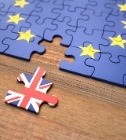There are currently two potential outcomes for the UK’s post-Brexit deal, according to Vanguard Europe chief economist Peter Westaway, with one slightly worse than the other for markets and the economy.
Talks over the UK’s post-Brexit relationship have been continuing throughout the Covid-19 pandemic but have become more pressing as the end of the negotiation period at the year-end nears.
The UK officially left the EU on the 31 January this year, entering an 11-month ‘transition period’, during which the UK has remained in both the EU customs and single market.
During his 2019 general election campaign prime minister Boris Johnson pledged to ‘Get Brexit done’ and provide some resolution to the trade agreement. Either with a deal or without one.
And having missed previous self-imposed deadlines, time is now running out for a trade deal to be struck.
Westaway, chief economist and head of investment strategy for Vanguard Europe, said that one thing has become perfectly clear, that the original free-trade deal envisioned is no longer the likely outcome.
Instead, there are now two potential limited outcomes “that aren’t tremendously different from each other in their likely long-term economic effects”, he said.
These two outcomes are a new “bare-bones deal” or a "no-deal”.
Some things will become a “fact of life”, with either deal Westaway said, as custom-checks on cross-border goods become the norm.
This is a more contentious topic when it comes to the border between non-EU Northern Ireland and Republic of Ireland.
“Deal or no-deal will also determine whether those checks occur between Northern Ireland and the rest of the UK or between Northern Ireland and the Republic of Ireland, which could have its own longer-term implications beyond trade,” Westaway said.
A no-deal would create a hard customs border between Northern Ireland and Republic of Ireland. However, this is not permitted under the terms of the Good Friday Agreement, of which the UK is a signatory.
Therefore, a no-deal scenario would likely bring disruptions in the form of vigorous border checks, queues at ports and a possible stock market sell-off, Westaway said.
But a bare-bones deal would also have implications.
Such a deal could create a customs border between Northern Ireland and the rest of the UK as Republic of Ireland goods can flow into Northern Ireland without being checked but not into the rest of the UK, effectively creating a border in the Irish Sea.
One of the big differences between the two deals will be its impact on UK GDP.
According to research carried out by Vanguard, a bare-bones deal would result in just over a 6 per cent decline in UK gross domestic product (GDP) over the next 10 years.
But a no-deal would see a bigger GDP decline of 8 per cent.
Westaway caveated that both scenarios impact on GDP “pale” when compared with the immediate economic impacts of coronavirus pandemic.
“But while the Covid-19 shock may eventually unwind once the crisis abates, the effects of Brexit on UK GDP are likely to persist over the next decade and beyond,” the strategist said.
As mentioned above, the uncertainty over what the post-Brexit trade deal would look like has been an ongoing factor in UK markets.
But even if a deal cannot be reached the UK could negotiate other trade deals with other countries.
He said: “Brexit was driven in part by the idea of the UK being able to strike out on its own and reach better trade deals with other countries. For the most part, this hasn’t happened. Yet.”
Indeed, the UK has already negotiated some trade deal with non-EU countries it previously had trading relationships with via the EU.
“But those countries represent only 18 per cent of the UK’s trade, and for the most part, these deals broadly replicate the terms of the deals previously in place through the EU,” Westaway said.
One trade style Johnson previously said he would like to emulate was a ‘Canada style agreement’.
But any expectations for that outcome “were shredded long before the final grind to ‘get Brexit done’,” according to Westaway.
The Canada Agreement is formally known as the Comprehensive Economic and Trade Agreement (Ceta), came provisionally into effect in 2017. The deal got rid of most tariffs on goods traded between the EU and Canada and increased export quotas.
“A UK-US trade deal has no immediate prospect,” Westaway said. “An Australia-style deal, which has also been mentioned, is essentially a no-deal option under which Australia-EU trade is conducted mostly by World Trade Organization rules.
“And then there’s the question about future trade with the EU, which has less at stake proportionately than the UK.”
He continued: “The implications for markets also hinge on deal versus no deal, the UK currency and stock markets likely to come under pressure in the absence of some sort of deal.”
Important issues over trade in financial services have been “allayed” for now, said Westaway, and the bulk of the markets’ response has already been baked into market prices since the 2016 referendum.
As such, the Vanguard economist said investors “would be wise to tune out the market noise that either scenario is likely to generate”.
Given that investors should still expect some increased market volatility from such a major market event over the coming months.
“The specifics of Brexit are difficult to predict, and risk perceptions can change quickly,” he said. “But we believe that expectations about Brexit’s effect over time on fundamentals such as future profits are largely priced in.”
He finished: “So the bar for investors is not whether Brexit will further affect asset prices but whether you think you have a better view than everyone else about what happens next.
“That’s a very high bar, and it reinforces Vanguard’s belief that investors should maintain a balanced portfolio across asset classes and regions in keeping with their well-considered long-term investment plan.”





